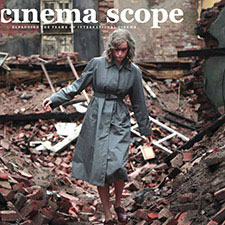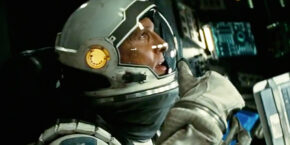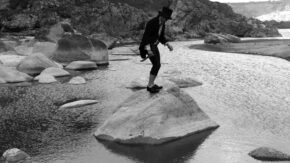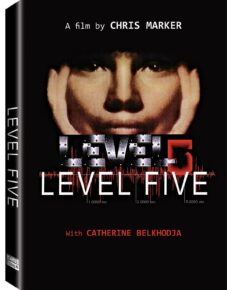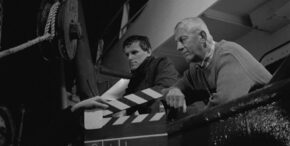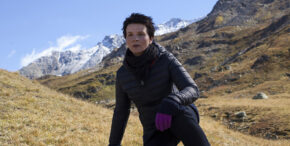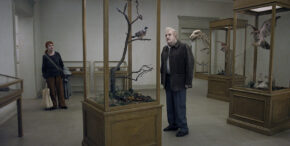CS61
Issue 61 Table of Contents
By Cinema Scope | 12/18/2014 | CS61, From Cinema Scope Magazine, Table of Contents
Christian Petzold’s Phoenix, Andrei Konchalovsky’s The Postman’s White Nights, Peter Strickland on The Duke of Burgundy and more...
Read More → Issue 61 Editor’s Note
By Mark Peranson | 12/18/2014 | Columns, CS61, From Cinema Scope Magazine
By Mark Peranson It’s taken an abnormally long while for me to find the will to pound out the missive this time around, due to something like a combination of mounting exhaustion and world-weariness. Let me try and explain. Living in what is clearly a golden age of popular-culture availability, with far too much available…
Read More → Film/Art | Carlos Amorales, Roberto Bolaño, and Amorality Within the Avant-Garde
By Andrea Picard | 12/18/2014 | Columns, CS61, From Cinema Scope Magazine
By Andréa Picard “We dreamed of utopia and we woke up screaming.”—Roberto Bolaño, First Infrarealist Manifesto Last year, Vogue Paris published an issue devoted to the “avant-garde,” seemingly another instance of mainstream popular culture co-opting the language and ethos of radical art and politics. At a certain juncture, this would not have seemed so…
Read More → Global Discoveries on DVD | Conspicuously Absent or Apt to be Overlooked
By Jonathan Rosenbaum | 12/18/2014 | Columns, CS61, From Cinema Scope Magazine
By Jonathan Rosenbaum For now the truly shocking thing was the world itself. It was a new world, and he’d just discovered it, just noticed it for the first time.—Orhan Pamuk, The Black Book I: Some Conspicuous Absences As a rule, this column has been preoccupied with what’s available in digital formats, but I’d like…
Read More → Exploded View | The George Kuchar Reader
By Chuck Stephens | 12/18/2014 | Columns, CS61, From Cinema Scope Magazine
By Chuck Stephens “I make moving pictures… My dad smoked and didn’t like the movie Ben-Hur because it was lacking in simulated humping sequences. My mom liked Barbara Stanwyck and I don’t think she (Stanwyck) ever simulated humping either. My mom respected her. In the 1950s everybody was making 8mm movies. You’d develop them cheap…
Read More → The Babadook (Jennifer Kent, US)
By Adam Nayman | 12/18/2014 | CS61, Currency, From Cinema Scope Magazine
By Adam Nayman A semi-surprise winner of the New York Film Critics Circle’s Best First Film award, Jennifer Kent’s Sundance breakout The Babadook feels very much like a debut even as nearly everything in it is familiar. It’s a fine line between cliché and archetype, and Kent’s tale of a single mother trying to protect…
Read More → Force Majeure (Ruben Östlund, Sweden/France/Denmark/Norway)
By Angelo Muredda | 12/18/2014 | CS61, Currency, From Cinema Scope Magazine
By Angelo Muredda With all respect to David Fincher’s Gone Girl, Ruben Östlund’s Force Majeure is the best formalist black comedy about marriage since Eyes Wide Shut (1999). Inasmuch as its outline suggests an essay on the crisis of masculinity—one distilled to a defining image (emblazoned on the vaguely apocalyptic poster) of a patriarch shirking…
Read More → Inherent Vice (Paul Thomas Anderson, US)
By Blake Williams | 12/18/2014 | CS61, Currency, From Cinema Scope Magazine, Top Ten Films 2014
By Blake Williams First we see the ocean—again. Before introducing us to the hazy, neon-stroked nocturne with which Pynchon chose to open his “lite” novel, Inherent Vice—wherein Shasta materializes from a back alley to offer a fateful proposition to ex-boyfriend Larry “Doc” Sportello—Paul Thomas Anderson presents a blip of a prologue to begin his adaptation.…
Read More → Letters to Max (Eric Baudelaire, France)
By Leo Goldsmith | 12/18/2014 | CS61, Festivals, From Cinema Scope Magazine, Spotlight
By Leo Goldsmith “I am writing you this letter from a distant land,” begins Chris Marker’s epistolary essay film-cum-travelogue Letter from Siberia (1957), establishing—from this neo-genre’s very first moments—those elements of distance and dialogue that will come to define the “letter film”: a direct address from an almost alien world, bridging gaps and perspectives through…
Read More → Episode of the Sea (Van Brummelen & De Haan and the inhabitants of Urk, Netherlands)
By Daniel Kasman | 12/18/2014 | CS61, Festivals, From Cinema Scope Magazine, Spotlight
By Daniel Kasman One of the most original films at the Toronto International Film Festival, Lonnie van Brummelen and Siebren de Hann’s ethnographic documentary Episode of the Sea reveals, if not declares, its antecedents immediately. This was not unexpected, since the filmmakers’ previous short in Wavelengths, and one of the best films of 2012, View…
Read More → The Iron Ministry (J.P. Sniadecki, US/China)
By Jordan Cronk | 12/18/2014 | CS61, Festivals, From Cinema Scope Magazine, Spotlight
By Jordan Cronk Issues of transit, dispersion, and the commercial and cultural tides precipitating each successive wave of Chinese migration have preoccupied filmmakers for decades. But as an influx of nonfiction work concerned with such sociological conditions continues to permeate international cinema, it’s clear that the relationship between artistic and industrial progression is anything but…
Read More → Heaven Knows What (Josh & Benny Safdie, US)
By Sean Rogers | 12/18/2014 | CS61, Festivals, From Cinema Scope Magazine, Spotlight
By Sean Rogers The opening sequence of Nicholas Ray’s They Live by Night (1948) depicts the warmly lit faces of soon-to-be lovers Bowie (Farley Granger) and Keechie (Cathy O’Donnell) hovering close to one another, looking to the other for comfort or reciprocation or heaven knows what, while music burbles and swells on the soundtrack. As…
Read More → Clouds of Sils Maria (Olivier Assayas, France/US)
By Andrew Tracy | 12/18/2014 | CS61, Festivals, From Cinema Scope Magazine, Spotlight
By Andrew Tracy “Ingmar Bergman once said that he makes a film with full consciousness that it will be shown on a screen that showed a Western the week before and will show a romance the week following, and that he likes this situation,” wrote the late Stanley Kauffmann in 1981, apropos of Spielberg’s nostalgia-plundering…
Read More → A Pigeon Sat on a Branch Reflecting on Existence (Roy Andersson, Sweden)
By Jason Anderson | 12/18/2014 | CS61, Festivals, From Cinema Scope Magazine, Spotlight
By Jason Anderson Filmmakers have a variety of reasons for enlisting non-professionals for their casts, but often what they seek is a rude, unvarnished vitality that actors can only simulate. Roy Andersson, however, works hard to dull any such spark from his chosen performers. First among his favoured tactics is the makeup that leaves their…
Read More → Dead Meat: Bruno Dumont’s P’tit Quinquin
By Michael Sicinski | 12/18/2014 | CS61, Features, From Cinema Scope Magazine, Interviews, Top Ten Films 2014
By Michael Sicinski P’tit Quinquin, the four-part miniseries that Bruno Dumont made for the ARTE network, had its world premiere earlier this year at Cannes as a 200-minute theatrical feature before screening to a record audience on French television in September. (It screened as a special presentation in the Fortnight, sort of a P’tit Quinquinzaine,…
Read More → Of Human Bondage: Peter Strickland on The Duke of Burgundy
By Jose Teodoro | 12/18/2014 | CS61, Features, From Cinema Scope Magazine, Interviews
By José Teodoro Given the painstakingly retro stylings of its opening title sequence (with ostentatious credits for lingerie and perfumes, the latter attributed to one Je Suis Gizelle) and the imprimatur of producers Ben Wheatley, Andy Starke, and Amy Jump, there are at first reasons to suspect that The Duke of Burgundy will keep its…
Read More → The Face of Another: Christian Petzold’s Phoenix
By Adam Nayman | 12/17/2014 | CS61, Features, From Cinema Scope Magazine, Interviews, Top Ten Films 2014
By Adam Nayman Nina Hoss has one of the great faces in cinema, so it’s perverse to see it swaddled in gauze at the beginning of Phoenix. Strapped into the passenger seat of a car being driven over the Swiss border into Germany at the end of World War II, her Nelly Lenz is a…
Read More → Who Can Tell of the Heroic Deeds of Israel?: Nadav Lapid’s The Kindergarten Teacher
By Jay Kuehner | 12/17/2014 | CS61, Features, From Cinema Scope Magazine, Interviews, Top Ten Films 2014
By Jay Kuehner. Films are often described as being “poetic,” but beyond the suggestion of a certain undefined lyricism, it is not entirely clear just what this means. Unrequited love, for example, might be given supple expression through an ambient absence, or the cruel passage of time might be suggested by the fixity of the…
Read More → Don’t Look Back: Life and Death and the Films of Mary Helena Clark
By Phil Coldiron | 12/17/2014 | CS61, Features, From Cinema Scope Magazine
By Phil Coldiron Why am I finding it so hard to write about Mary Helena Clark’s films? There’s something to their poetry… But to even start a claim like that, we have to have a working definition of poetry in (relation to?) the cinema, for now; right now. Because we’ve all finally turned our backs…
Read More → 
